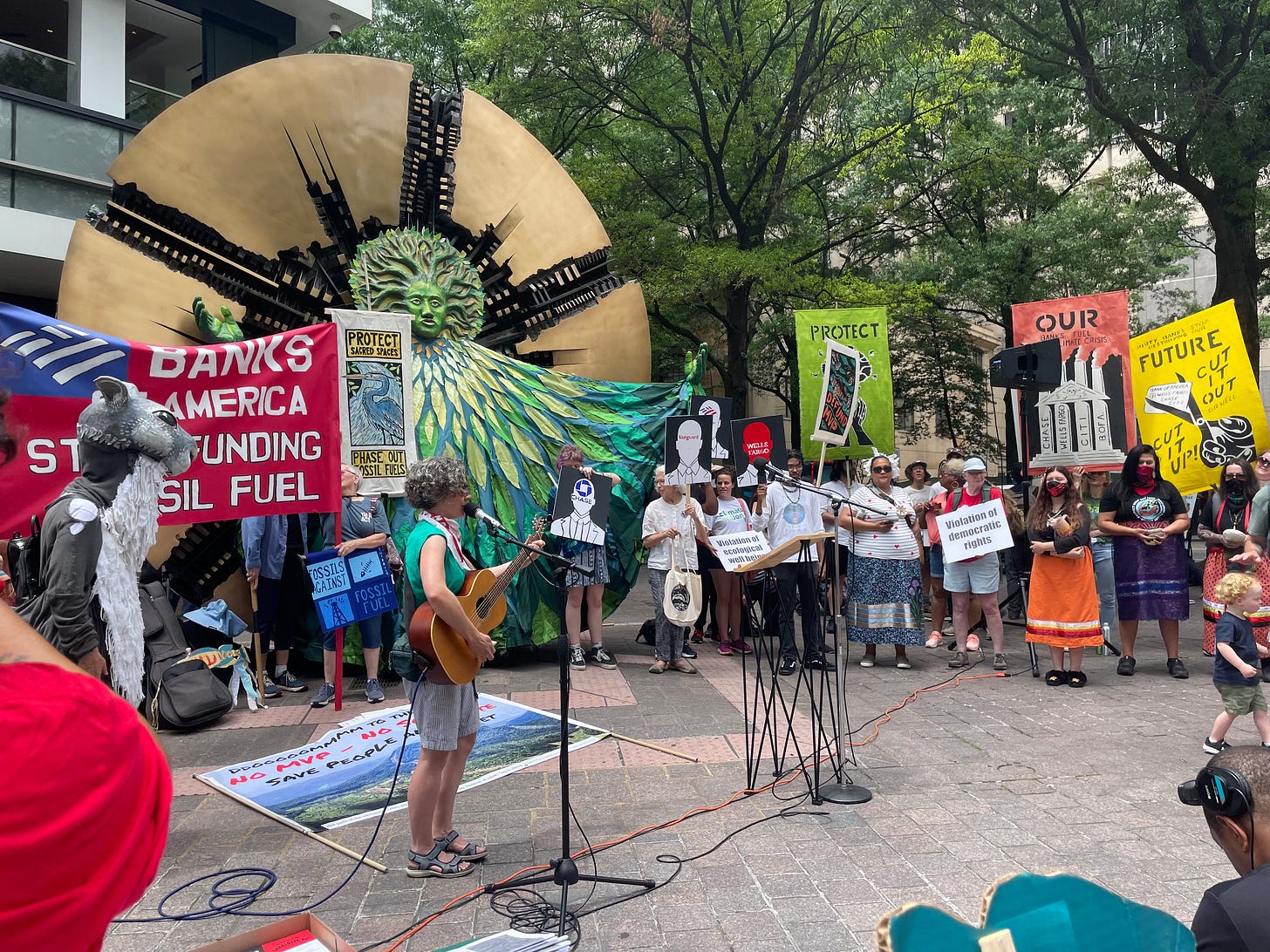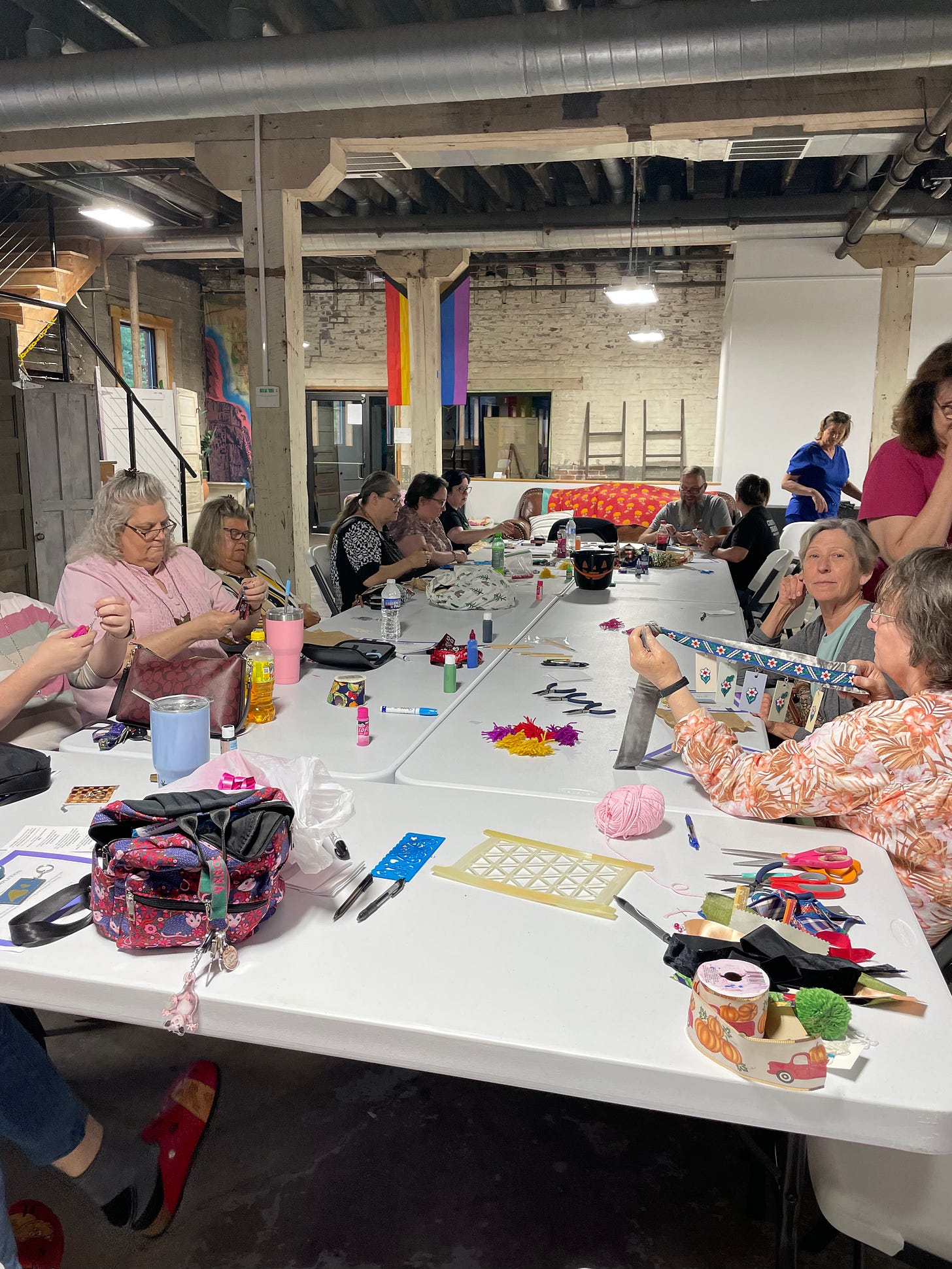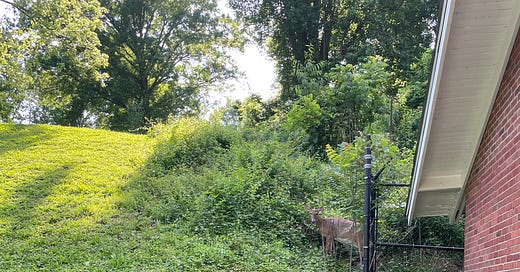Freeing our bellies to free our minds
Or: how bad is it that I don't know how to grow a tomato?
One thing I’ve noticed since moving to West Virginia eight months ago is that almost everyone I know is growing something edible. In their backyards or back decks or on windowsills. My first day on the job at my nonprofit, a coworker from our agriculture team told me he was invested in helping small farmers get their produce to markets (and into local school cafeterias) because “by freeing our bellies we free our minds.” If that’s true, my mind is probably trapped in the Kroger freezer section under a bag of green peas that was harvested who knows where and who knows when and probably made its way to Huntington on a series of insulated trucks.
I do spend some of my monthly SNAP dollars (all Americorps are automatically eligible for food stamps) on in-state produce from my local co-op, but the difference between a jar of local honey for $12 and a jar of honey from who-knows-where for $4.50 at a big-box store starts to become undeniable when you’re on a budget. In environmental and urban policy classes at UChicago, we talked about food deserts and about the price barrier of farmers’ markets. Well, now practice meets theory: I’ll buy the Wonderbread over the beautiful loaf made down the street that is twice the price (as it should be, to be clear). There is a “SNAP stretch” program which means that for every dollar I spend at the local food co-op I get a dollar back, but only to spend on produce. Unfortunately, I can only eat so many tomatoes by myself. And my coworkers don’t need extra tomatoes—they’re growing them on their back decks.
As for me, I have no back deck, and the cat tries to eat everything green. I dream of a backyard or a plot in a community garden when I am more established in one place. But I’ve never grown anything edible to fruition, and the more I talk to coworkers about their plots the more I realize there are common gardening issues that I never would have thought of, like mold and deer. It baffles me that I forgot, somewhere in the past twenty-three years, to learn how to grow food besides the basil and mint that my mom religiously tends in a sunny spot above the kitchen sink. Do tomatoes require trellises? Do peas grow in my climate? I remember being ten or eleven and going with my grandpa to his garden plot at a community center in Sterling, Virginia. I remember watering plants with rainwater from a large barrel and walking among the raised beds, observing what was growing there. But if I asked any questions or planted any seeds, I have long since forgotten.
I know there is no such thing, really, as “having a green thumb” or not having one. Sure, some people are more suited to growing things because they are patient or because they grew up in farming families. But it’s not a stuck quality—you can develop such a thumb. The only thing standing between me and a carrot is a learning curve. Unfortunately I hate learning curves, and have since I first got admitted to a third-grade Gifted and Talented program, from which point on I relished in being a good reader and writer who buys microwave meals because she doesn’t have to grow a carrot. Joke’s on me, because now I don’t know how, and I want to.
Why the urge to garden? First of all, I accidentally befriended a psychic shortly after moving here, and she told me I have a spiritual blockage that can be removed if I reconnect with nature. I’m not going to break that down for you, it seems pretty straightforward. Second, the popularity of homesteading among my coworkers and friends here is infectious. I would be lying if I said that my dream for a home garden and a roof full of solar panels isn’t partly inspired by the increasingly proto-fascist turn police and government legislation has taken in the U.S. and around the world lately. As this Guardian article notes, “Since 2017, more than 250 anti-protest bills have been introduced in 45 states including legislation to eliminate driver liability for hitting protesters” and legislation that allows you to be charged with a felony for participating in “riots” (in Florida, this definition can encompass any large gathering where police feel that property damage could be “imminent”). The same article details how massive donations from oil and gas companies happen to have been made to all of the lawmakers sponsoring these bills. There are now far more serious legal consequences in many states for protestors who protest near pipelines or other “critical infrastructure” (think Standing Rock).

I’ll readily admit that I’m very nervous at this moment, when so many types of danger seem to be converging. West Virginia is at very high risk for flooding caused by the increased rainfall climate change is forecasted to bring—my friends and neighbors already got a sneak peek when they experienced record floods here in 2016. Not to mention, President Biden’s insistence on tossing away the youth vote by continuing to send arms to Israel makes the possibility of a Trump presidency, live-streamed from house arrest, loom closer. Also, my Republican-run state legislature keeps trying to scale back the SNAP program despite its massive popularity and the great need for it in this, one of the poorest states in America, so my credited lettuce is not guaranteed. Between AIPAC lobbyists and fossil fuel lobbyists taking full advantage of Citizens United, our democracy looks rather sickly. In the midst of this, there is some nebulous comfort in being able to can one’s own peaches if a mudslide takes out the Kroger.
But there’s an individualistic association with homesteading or growing some of your own food. I picture myself alone in a little house on a hill, staring at rows of green beans that I cannot possibly eat myself. In a stereotypical image of self-reliance, there would also be a sawed-off shotgun propped against my door (given how easy it is for someone to turn your own gun on you, I am not interested; I know some people own them for bears, but I don’t know how to effectively shoot a bear anyway). I don’t jive with this kind of off-grid life, the one that is paranoid and lonely. The folks I know who grow things have always offered to share. There is a possible vision of the homesteader (a vision that I suspect is closer to current reality than Nat Geo’s Doomsday Preppers) that is communal and civically active. I believe very much in public institutions (schools, community centers, union halls) and I think you can be opposed to the anti-democratic actions of your federal government or judicial system while advocating for the state and local government programs that make life possible. I know folks with family farms and vaccinated kids—Lord knows you don’t want the whole holler getting the flu. I’m personally thrilled to have my tetanus shots, given that my exposure to rusty metal since moving to a post-industrial town full of abandoned factories has gone up about 1000%. Rural life is highly interdependent by nature—your neighbors are the folks who know what’s up. A homesteader who is hostile and individualistic is, in short order, probably a dead homesteader. We can—really, we have to—free our bellies and our minds together.

Is that what we’re doing when we re-learn what the Earth can provide for us: freeing our minds? Sure, I buy it. It’s not that Big Kroger is making me mentally weak through Kraft mac ‘n’ cheese, but that planting something would probably expand my imagination. If me and Mother Earth, with some gardening advice from friends, can make a tomato, then what else can we make together? If I can learn this new skill, then what else can I learn? Maybe we don’t call it self-reliance (because no one can do anything entirely alone), maybe we re-label it as re-connectedness. You’re not really off the grid, you’re just on a different grid (the grid of the sun! Okay I’ll stop now). A free mind is really just an open mind, a mind that says, “yes, I can imagine learning to grow a carrot. I can imagine riding my bike to work or the coffee shop. I can imagine becoming more involved in my community.” If you want to come live in my cabin in the woods in 2040 then yes, I will take your power tools, but mostly I want your imagination.




